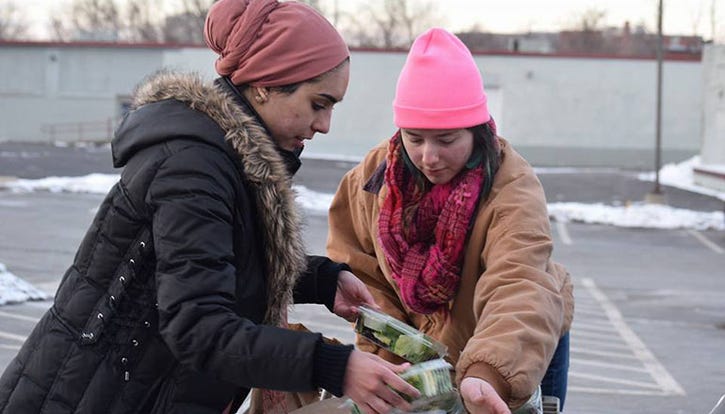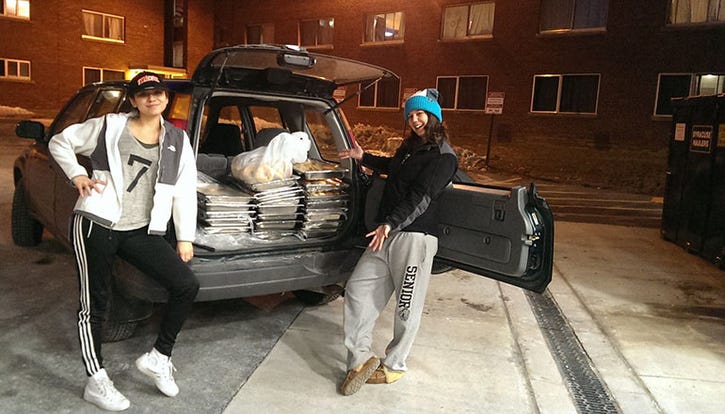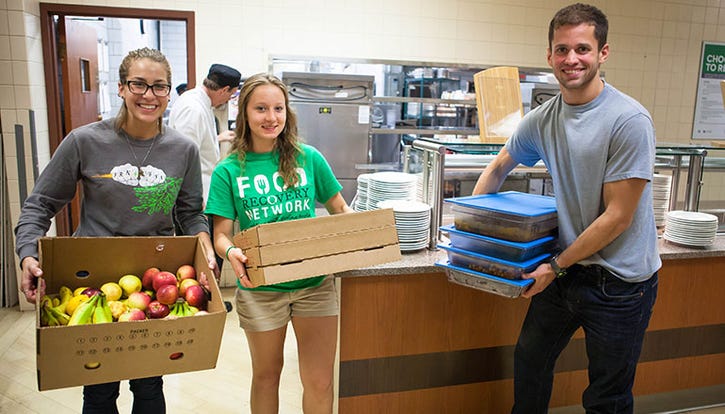Women Leaders in Waste: Regina Anderson of Food Recovery Network
Anderson has worked in the nonprofit sector for more than a decade and is helping combat food waste and hunger through recovery efforts.

Regina Anderson is someone who is striving to make the world a better place. From her work in the nonprofit sector to tackling challenges like poverty and food insecurity, she is breaking down barriers one effective effort after another.
As executive director of Food Recovery Network (FRN), a national nonprofit that unites students at colleges and universities to fight food waste and hunger by recovering perishable food that would otherwise go to waste from their campus dining halls and donating it to those in need, Anderson is responsible for setting FRN’s vision, strategy and fundraising efforts; developing and implementing three-year strategic plans; working with stakeholders and partners to set and achieve goals; teaming with businesses, events and public institutions to reduce food waste at the source; working with students to develop and run FRN chapters; growing FRN’s budget; and expanding FRN’s fellowship program.
“My role is very inspiring because I get to see firsthand what the students and partner agencies are doing to recover perishable food and combat food waste and other issues,” says Anderson. “The students really go above and beyond their everyday duties because they are faced with real-world issues. For example, over the last couple of years, students were affected by hurricanes, wildfires and even a mass shooting. Instead of letting those tragic events get them down, they started relief efforts and worked to build those communities back up. They are really nothing short of amazing.”

Anderson has been working in the nonprofit sector for more than a decade and got her start in college doing volunteer recruitment for AmeriCorps, a network of national service programs that aim to improve lives and foster civic engagement.
“I had never heard of the nonprofit sector before working at AmeriCorps, but my friend told me about the opportunity that was available, and it really sang to me,” says Anderson. “After my time at AmeriCorps, I knew I wanted to continue working in a sector that benefits communities, so I started to shape my time at undergrad around working for a nonprofit.”
After earning her bachelor’s degree in English literature from the University of Maine at Augusta, Anderson worked for American Civil Liberties Union of Maine. There, she gained the building blocks necessary to begin her career and received the technical support she needed to excel in the nonprofit sector.
She then went on to receive her master’s degree in literary and cultural studies from Carnegie Mellon University and to work as the regional internship center director for the Coro Center for Civic Leadership in Pittsburgh. In that position, she teamed with employers in various sectors to establish internship programs and to match talented individuals with those opportunities. She also did volunteer work and sat on a number of nonprofit boards.
“At Coro, I learned a lot of the skills that I am infusing into FRN’s fellowship, such as how to run a meeting more efficiently, how to ask open-ended questions and how to create a successful strategic plan,” states Anderson. “Coro really prepared me for the work I am doing now, and I am forever grateful for that.”
Whiling working for Coro and living in Philadelphia, Anderson hosted a large Valentine’s Day party every year. What started off as a small gathering for friends turned into a 300-plus attendee party that benefitted two nonprofits whose boards Anderson sat on.
“I have always loved to throw and attend parties, and that is really how I got started with event planning and leadership,” she says. “When I moved to Washington, D.C., the party sort of fizzled away, and that’s when I realized how important it is to keep things self-sustaining even if you aren’t there.”
Anderson worked at Coro for five years before moving to Washington, D.C., to work for Independent Sector, a coalition of nonprofits, foundations and corporate giving programs, and LIFT, a national nonprofit organization that works to break the cycle of poverty for families.
LIFT was experiencing a large growth pattern at the time, and Anderson’s role as senior manager of talent and culture development was to support managers in recruitment and to help them put together items like effective performance evaluations, meeting outlines and notes and training materials.
“Ensuring that managers had these items in order was very important because a lot of people working in the nonprofit sector often don’t receive access to training materials to receive promotions because the sector is strapped for cash,” explains Anderson. “I know the hard work that people do within this sector, and I wanted to give them the essential tools needed to be even more successful in their careers.”
Anderson left LIFT after about three years to work for FRN, where she has been working as executive director for nearly four years.
The career change was exciting, but not easy, for Anderson. When she took over FRN, a nonprofit that was previously run by founders, she had to try and get board members, stakeholders, partners and fellow coworkers to understand her vision and leadership style.

“It wasn’t easy starting out. In this role, I learned that I need to be very transparent with people because our partners, stakeholders, board members, students and others are all part of this, and they deserve to be well informed about what we are doing at FRN and what we are working toward,” she says. “By being transparent, I have been able to diversify our funding, create new partnerships and develop an effective three-year strategic plan.”
The strategic plan is a living document and something that FRN references daily. Anderson is currently wrapping up her first three-year plan and gearing up to design FRN’s next three-year plan, which will include goals through 2022.
The first strategic plan included a shift from quantity of chapters to quality of chapters, ensuring that all chapters were engaged and actively participating. It also outlined pillars for growth: strength and capacity of the movement, strength and capacity of the staff, strength and capacity of the board and strength and capacity of alumni.
As FRN continues to grow, it plans on building upon these pillars and using influence to drive change.
“We have a national conference every year, and that’s where we ensure the movement is heathy and that we are committed to the work we do,” says Anderson. “We are constantly building up our Food Recovery Verified program, which is how we support the business sector in recovery surplus food, and the conference is a great place for us to create new partnerships and educate individuals and businesses on the work we are doing.”

One of the biggest challenges that comes with getting U.S. establishments to increase recovery and reduce food waste is the fact that food is cheap, Anderson points out. Some grocery stores reject food that has a little dirt on it or that’s different in shape or size simply because it’s cheap to do so and they feel shoppers won’t purchase “imperfect” produce.
“At FRN, we are trying to change that behavior and mindset because those food items are still edible and delicious,” states Anderson. “One of FRN’s founders, Ben Simon, is expanding on that mission through Imperfect Produce, and one of FRN’s former interns, Evan Lutz, is also expanding on that mission through Hungry Harvest. We are all doing our part to ensure food recovery is the norm, not the exception.”
To spread its mission even further, FRN encourages walks of all life to join its work and launch a career in the nonprofit sector.
“I believe the statistic still rings true that 70 percent of the nonprofit sector is comprised of women, so I encourage females, those who identify as male, transgender or queer and those who don’t identify as a specific gender to pursue a career in the nonprofit sector,” says Anderson. “We need you, and there are some great people in this sector who will be in your corner and support you throughout your career. I would advise looking at the sector as a collaborator and trying to work with as many organizations as you can. FRN doesn’t work alone, and we wouldn’t be able to move the needle on some huge social problems and change the culture if it weren’t for collaboration. I would love to see more collaborators enter this sector.”
As we continue this series, we invite our readers to email Waste360 Editorial Director Mallory Szczepanski at [email protected] with suggestions of women to feature in the coming months.
About the Author
You May Also Like




